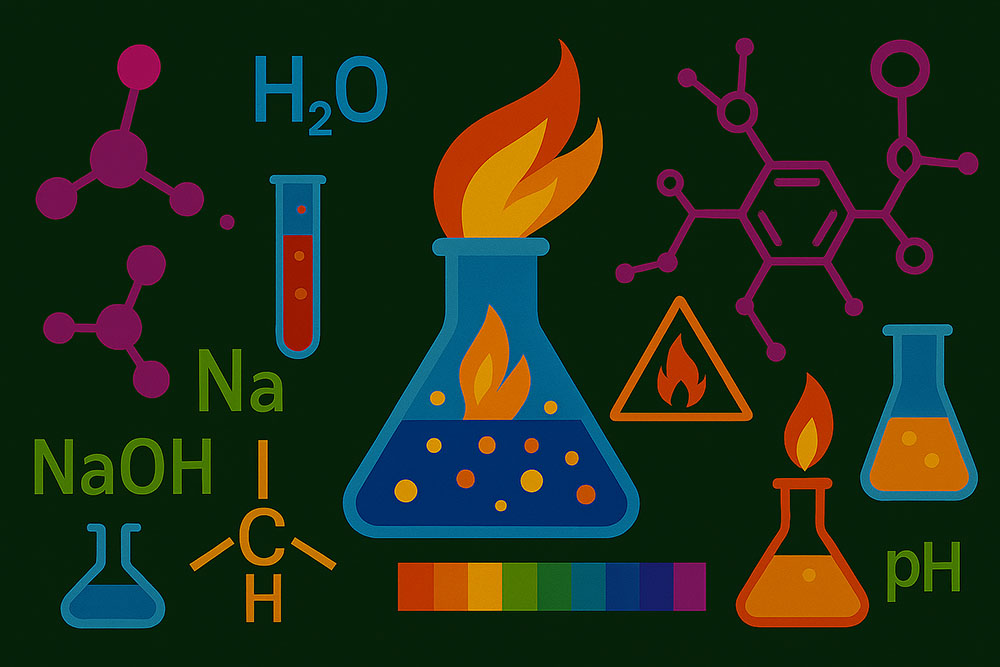Department of Chemistry
Established in 2019, the Department of Chemistry at Chirchik State Pedagogical University is dedicated to developing highly qualified and competitive chemistry educators. The department focuses on enhancing students' advanced chemistry skills and fostering intercultural communication. It actively promotes fundamental and applied research, aims to establish a leading scientific school, and integrates modern teaching methods. The department also engages in extensive international collaborations to elevate the quality of chemical education and research to global standards.
Year of Establishment: 2019 The department was established as the "Department of Chemistry" within the Faculty of Exact and Natural Sciences, in accordance with Decision No. 1 of the Council of Chirchik State Pedagogical University, dated August 29, 2019. Currently, the department focuses on teaching chemistry for both chemistry specialization and non-chemistry fields.
DEPARTMENT MISSION AND OBJECTIVES
Department Mission: The primary task of the Department of Chemistry is to develop students' advanced chemistry skills and to form their intercultural communication competence.
Our Objectives:
- Develop the university based on the Innovative Cluster of Pedagogical Education.
- Train highly qualified, competitive specialists in accordance with international standards; activate fundamental and applied research in the field of chemistry.
- Create an IPK (Scientific Pedagogical Cadre) scientific school by developing scientific work in the scientific laboratory established at the Department of Chemistry, and improve methods of teaching and learning chemistry.
Mid-Term Strategic Development Program of the Department of Chemistry (2022-2025)
CURRICULA
The department conducts chemistry classes for bachelor's degree students.
2nd-year curricula:
- 60110800 - Chemistry: Analytical Chemistry
- 60110800 - Chemistry: Physical Chemistry
- 60110800 - Chemistry: Colloid Chemistry
- 60110800 - Chemistry: Organic Chemistry
3rd-year curricula:
- 60110800 - Chemistry: Organic Chemistry
- 60110800 - Chemistry: Bioorganic Chemistry
- 60110800 - Chemistry: Chemistry of Science, Technology, and Production Fundamentals
- 60110800 - Chemistry: Chemistry of Chemical Technologies
4th-year curricula:
- 60110800 - Chemistry: Materials Science Chemistry
- 60110800 - Chemistry: Food Chemistry
- 60110800 - Chemistry: Structure of Matter and Quantum Chemistry
- 60110800 - Chemistry: Agrochemistry
Long-Term and Mid-Term Strategic Plan of the "Chemistry" Department of Chirchik State Pedagogical University
Description of the Chemistry Department's Strategic Plan
Chirchik State Pedagogical University was established by Resolution of the President of the Republic of Uzbekistan No. PQ-3152 dated July 27, 2017, "On the Establishment of Chirchik State Pedagogical Institute in Tashkent Region." The Department of Chemistry was established within the Faculty of Exact and Natural Sciences based on Decision No. 1 of the Council of Chirchik State Pedagogical University, dated August 29, 2019. Currently, the Department of Chemistry operates within the Faculty of Physics and Chemistry. Efforts are being made to raise the quality of chemistry education to a high level by organizing a system for training highly educated pedagogical staff in chemistry in line with advanced foreign experience and international standards in our republic, and by further improving it with the help of digitalization technologies.
The strategic mission of the department: To train highly qualified, competitive specialists in accordance with international standards; to activate fundamental and applied research in the field
The strategic goal of the department: To improve the quality of the educational process and scientific research while maintaining a high level of teaching staff.
The prospective vision of the department: The formation of the department as an educational and scientific center on a republican scale.
Faculty motto: "Uchites uchitsya" (Learn to learn).
Main Directions of the Chemistry Department's Mid-Term Strategic Plan
A number of positive results have been achieved in the main directions of developing the pedagogical education system in our republic. In particular, pedagogical education classifiers have been improved, the content of pedagogical education is being updated, the information environment of education and scientific and methodological support for the professional training of education system specialists are being enriched. At the same time, there are a number of pressing issues in further improving the preschool education system, fundamentally improving the level of children's school readiness, introducing modern educational programs into the educational process, and providing educational institutions with qualified pedagogical staff in the areas of comprehensive intellectual, moral, aesthetic, and physical development of young people.
Based on the above-mentioned achievements, problems, and the goals set by the university, the department focuses its efforts on the following main directions of developing a continuous pedagogical education system:
Goal-oriented direction: To create an IPK scientific school by developing scientific work in the scientific laboratory established at the Department of Chemistry, and to improve methods of teaching and learning chemistry.
Partnership-oriented direction: Close cooperation with higher education institutions and scientific research institutes of Russia and Kazakhstan. Establishing cooperation with the Institute of General and Inorganic Chemistry of the Academy of Sciences of the Republic of Uzbekistan and bioorganic institutes. Studying the activities of schools in Chirchik city, Tashkent region, and providing practical assistance, organizing master classes and seminar-trainings on various topics.
Key Principles of the Department's Strategic Policy
The university organizes its activities in its main directions according to the following principles:
- Social partnership of educational institutions, public organizations, and production enterprises.
- Competitiveness (ensuring the unity of theoretical and practical knowledge in preparing graduates for effective professional activity).
- Optimization (re-designing processes that increase efficiency in the continuous pedagogical education system while reducing financial costs).
- Harmony of tradition and innovation (designing changes in the continuous pedagogical education system based on the achievements of pedagogical science and practice).
- Continuity of pedagogical education (forming a system of mutually proportionate and differentiated educational programs at various levels and stages that ensure professional development throughout the pedagogical department).
- Consistency of general secondary, specialized secondary, higher pedagogical education, postgraduate education, and additional education (reliance on a unified system of psychological and pedagogical principles, consistency and sequence in mastering educational programs, a unified information and educational space).
Directions of Marketing Research in the First Stage of the Department's Mid-Term Strategic Plan (mid-term 2022-2025)
- Goal-oriented – research aimed at generalizing resources and ensuring the university's leading position in addressing problems and complexities related to sustainable human development.
- Partnership-oriented – research aimed at improving mutually beneficial cooperation and integration in education and scientific research with leading foreign universities, scientific and educational organizations, and high-tech organizations.
Main Priority Tasks of the Department's Long-Term and Mid-Term Strategy
Conducting advanced scientific research. The high socio-cultural duty of the pedagogical profession, i.e., solving professional tasks on a competence basis in modern pedagogical norms, preparing, retraining, and improving the qualifications of education specialists, requires conducting broad worldview and spiritual-moral activities in conjunction with advanced information technologies. In educational standards, this integrity is ensured by forming three groups of competencies in the future education specialist. These are:
- Academic – including reading, knowing, and acquiring knowledge skills.
- Socio-personal – including knowledge of ideological and moral values of society and the state based on cultural values, and ways to adhere to them.
- Professional – including the ability to find solutions to tasks in the chosen professional field, apply digital technologies, plan, and ensure their implementation.
The research directions within the PTIK (Pedagogical Education Innovation Cluster) are as follows:
- Applying the results of fundamental research in chemistry to the educational process based on advanced scientific research.
- Developing and implementing a modern scientific chemistry laboratory.
- The formation of the department as an integral and scientific center on a republican scale.
The modern pedagogue is entrusted with specific unique tasks such as preserving national and cultural traditions and, on this basis, social harmony. Therefore, a pedagogue must exert their efforts not only in the educational process but also in the upbringing process. The following competencies are considered important in the field of upbringing:
- Readiness for spiritual and moral upbringing of children in a globalized world; organizing socially significant initiatives (volunteer activities, charity events, etc.).
- Having experience in promoting healthy ideas among students, developing skills in preventing the dire consequences of unhealthy lifestyles, harmful habits, and aggression.
The training of education specialists must ensure integrated resulting achievements such as the formation of knowledge and skills in the harmony of all competencies in students, the ability to solve personal, social, and professional problems, and multifaceted abilities.
The content of modern pedagogical education must be open and constantly evolving, create a positive environment aimed at effective pedagogical activity in future pedagogues, stimulate interest in independent learning and upbringing, encompass variable and invariant components, reflect the genesis of the pedagogical system and activity, adapt to the prospective demands of the individual and society, reflect the interdisciplinary nature of universal knowledge, and find its place in the continuous pedagogical education environment.
The planned results are as follows:
- The goal of pedagogical education is to form modern pedagogical staff with new relevant competencies.
- Developing a professional standard for a pedagogue who is socially adapted, embodies new competencies, and defines educational standards and competency models at all stages of continuous pedagogical education.
- Creating new educational standards and updated educational and program documents for pedagogical education.
- Establishing new scientific and methodological support for educational standards.
These results are achieved through "Advanced Research Centers (ARCs)," selected by the department based on priority and bringing together the most effective scientific (creative) teams conducting international-level scientific research. Examples of such ARCs include:
- Methodology for developing students' experimental skills.
- Studying composite materials based on interpolymers and phosphogypsum.
Criteria for evaluating the effectiveness of ARC activities include assessing the scope of scientific research and educational activities, financial stability, publication activity, attracting leading foreign scientists, implementing joint scientific projects and educational programs with leading foreign higher education institutions, training highly qualified personnel, involving students and doctoral candidates in the implementation of scientific and innovative projects, and creating and commercializing intellectual property objects.
In the implementation of ARC activities, renowned scientists with high scientific metric indicators are appointed as scientific leaders, and they are granted the right to independently manage activities and form teams. This ensures a certain degree of independent activity and allows for the involvement of the intellectual potential and technological competencies of any department and laboratory of the university, as well as integration partners, including foreign universities and research centers.
According to the department's mid-term strategic plan, by 2025, the publication activity indicators, i.e., the number of publications in Web of Science and Scopus databases per scientific and pedagogical staff member, should be 0.8, the average number of citations to scientific works of one scientific and pedagogical staff member should be 1, and the share of publications in cooperation with foreign scientists should be 10%.
According to the long-term strategic plan, by 2030, the number of publications in Web of Science and Scopus databases per scientific and pedagogical staff member is expected to be 1, the number of citations to scientific works of one scientific and pedagogical staff member is expected to be 1, and the share of publications in cooperation with foreign scientists is expected to be 20%.
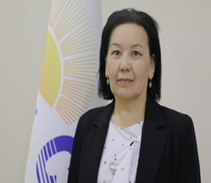
Kurbanova Aypara Djoldasovna
Head of the Chemistry Department
- Phone: +998717166805
- Email a.kurbanova@cspu.uz
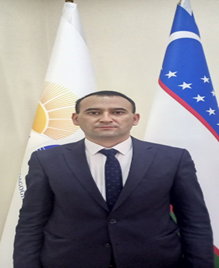
Ziyadullayev Mirjalol Egamberdi o’g’li
Kafedra Dotsenti
- Phone: +998717166805
- Email m.ziyadullayev@cspu.uz
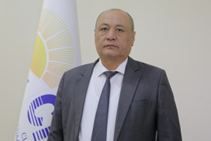
Komilov Qamariddin Urinovich
Kafedra Dotsenti
- Phone: +998717166805
- Email k.komilov@cspu.uz
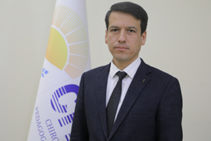
Matyakubov Azamat Quvondikovich
Katta o’qituvchi
- Phone: +998717166805
- Email matyakubov@cspu.uz
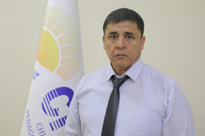
Mirzaraximov Axmadjon Abduqaxarovich
Kafedra o‘qituvchisi
- Phone: +998717166805
- Email a.mirzaraximov@cspu.uz
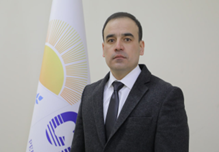
Niyozov Xabibullo Abdullayevich
Katta o‘qituvchi
- Phone: +998 94 621 67 64
- Email x.niyozov@cspu.uz
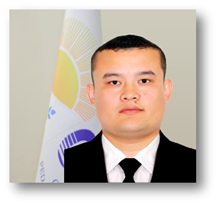
Nurmatov Doston Uralovich
Kafedra o‘qituvchisi
- Phone: +998717166805
- Email dostonnurmatov9895@gmail.com
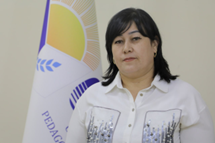
Qurbonova Muattar Erkinovna
Katta O‘qituvchi
- Phone: +998999368327
- Email m.qurbonova@cspu.uz
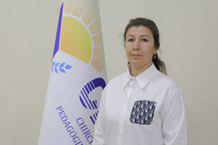
Xasanova Nargiza Ismagilovna
Katta o‘qituvchi
- Phone: +998917781681
- Email xasanovanargizaa@gmail.com
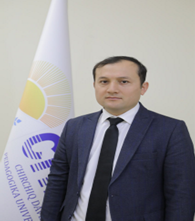
Yodgorov Baxtiyor Orziqulovich
Katta o‘qituvchi
- Phone: +998717166805
- Email b.yodgorov@cspu.uz
